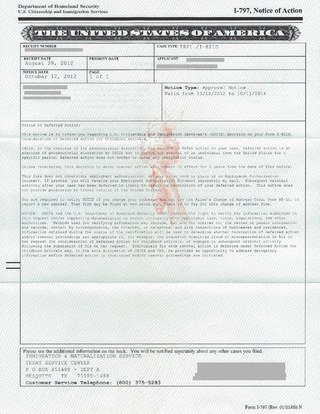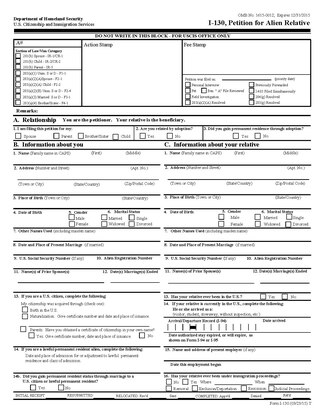Related Research Articles

A green card, known officially as a permanent resident card, is an identity document which shows that a person has permanent residency in the United States. Green card holders are formally known as lawful permanent residents (LPRs). As of 2023, there are an estimated 12.7 million green card holders, of whom 9 million are eligible to become United States citizens. Approximately 18,700 of them serve in the U.S. Armed Forces.

The Illegal Immigration Reform and Immigrant Responsibility Act of 1996, enacted as division C of the Omnibus Consolidated Appropriations Act of 1997, made major changes to the Immigration and Nationality Act (INA). IIRAIRA's changes became effective on April 1, 1997.
TN status is a special non-immigrant classification of foreign nationals in the United States, which offers expedited work authorization to a citizen of Canada or a national of Mexico. It was created as a result of provisions of the North American Free Trade Agreement that mandated simplified entry and employment permission for certain professionals from each of the three NAFTA member states in the other member states. The provisions of NAFTA relevant to TN status were then carried over almost verbatim to the United States–Mexico–Canada Agreement that replaced NAFTA in 2020.

Parole, in the immigration laws of the United States, generally refers to official permission to enter and remain temporarily in the United States, under the supervision of the U.S. Department of Homeland Security (DHS), without formal admission, and while remaining an applicant for admission.
U.S. Citizenship and Immigration Services (USCIS) is an agency of the United States Department of Homeland Security (DHS) that administers the country's naturalization and immigration system. It is a successor to the Immigration and Naturalization Service (INS), which was dissolved by the Homeland Security Act of 2002 and replaced by three components within the DHS: USCIS, Immigration and Customs Enforcement (ICE), and Customs and Border Protection (CBP).

Visitors to the United States must obtain a visa from one of the U.S. diplomatic missions unless they are citizens of one of the visa-exempt or Visa Waiver Program countries.
An H-4 visa is a United States visa issued to dependent family members of H-1B, H-1B1, H-2A, H-2B, and H-3 visa holders to allow them to travel to the United States to accompany or reunite with the principal visa holder. A dependent family member is a spouse or unmarried child under the age of 21. If a dependent of an H-1B, H-1B1, H-2A, H-2B, or H-3 worker is already in the United States, they can apply for H-4 immigration status by filing Form I-539 for change of status with United States Citizenship and Immigration Services (USCIS).

The United States recognizes the right of asylum for individuals seeking protections from persecution, as specified by international and federal law. People who seek protection while outside the U.S. are termed refugees, while people who seek protection from inside the U.S. are termed asylum seekers. Those who are granted asylum are termed asylees.

A Form I-766 employment authorization document or EAD card, known popularly as a work permit, is a document issued by the United States Citizenship and Immigration Services (USCIS) that provides temporary employment authorization to noncitizens in the United States.

The Cuban Adjustment Act, Public Law 89-732, is a United States federal law enacted on November 2, 1966. Passed by the 89th United States Congress and signed into law by President Lyndon Johnson, the law applies to any native or citizen of Cuba who has been inspected and admitted or paroled into the United States after January 1, 1959 and has been physically present for at least one year, and is admissible to the United States as a permanent resident.

Deferred Action for Childhood Arrivals (DACA) is a United States immigration policy. It allows some individuals who, on June 15, 2012, were physically present in the United States with no lawful immigration status after having entered the country as children at least five years earlier, to receive a renewable two-year period of deferred action from deportation and to be eligible for an employment authorization document.
Credible fear is a concept in United States asylum law whereby a person who demonstrates a credible fear of returning to their home country cannot be subject to deportation from the United States until the person's asylum case is processed.

Form I-130, Petition for Alien Relative is a form submitted to the United States Citizenship and Immigration Services by a United States citizen or Lawful Permanent Resident petitioning for an immediate or close relative intending to immigrate to the United States. It is one of numerous USCIS immigration forms. As with all USCIS petitions, the person who submits the petition is called the petitioner and the relative on whose behalf the petition is made is called the beneficiary. The USCIS officer who evaluates the petition is called the adjudicator.
The Legal Immigration Family Equity Act of 2000, also known as the LIFE Act and as the Legal Immigration and Family Equity Act, along with its Amendments, made some changes to laws surrounding immigration for family members of United States citizens and Lawful Permanent Residents, as well as people eligible for employment-based immigrant visas, in the direction of making it easier for family members and immigrant workers to move to and adjust status within the United States. It was passed on December 21, 2000, as title XI of Pub. L. 106–553 (text)(PDF).
Special Immigrant Juvenile Status (SIJS) is a special way for minors currently in the United States to adjust status to that of Lawful Permanent Resident despite unauthorized entry or unlawful presence in the United States, that might usually make them inadmissible to the United States and create bars to Adjustment of Status. The key criterion for SIJS is abuse, neglect, or abandonment by one or both parents.
The Central American Minors (CAM) Refugee and Parole Program is a U.S. refugee and parole program established in November 2014 by the Obama administration. It is a refugee protection and family reunification pathway on which several thousand families rely and for which tens of thousands more families are technically eligible. The CAM Program was designed to permit certain children and other eligible family members to escape life-threatening danger and other humanitarian crises and to reunite with parents or relatives in the United States. This program provides certain qualified parents and legal guardians to apply for their children and other eligible family members, who are nationals of and physically present in El Salvador, Guatemala, and Honduras, to come to the United States as refugees or parolees. The CAM Program has been operational from 2014 to 2017-18 when it was terminated over a series of actions; and from 2021 to the present, when it was restarted in two phases, first for some previously closed cases and then for new applications. To date, most CAM Program beneficiaries have been Salvadoran families of Temporary Protected Status (TPS) holders, making up 86 percent of applicants from the 2014–2017. Since the Biden administration restarted the CAM Program for new applications, the CAM Program has had expanded eligibility criteria, including parents and guardians with pending asylum applications or U visa petitions, which should enable many more Guatemalans and Hondurans to apply.
Federal policy oversees and regulates immigration to the United States and citizenship of the United States. The United States Congress has authority over immigration policy in the United States, and it delegates enforcement to the Department of Homeland Security. Historically, the United States went through a period of loose immigration policy in the early-19th century followed by a period of strict immigration policy in the late-19th and early-20th centuries. Policy areas related to the immigration process include visa policy, asylum policy, and naturalization policy. Policy areas related to illegal immigration include deferral policy and removal policy.

The immigration policy of American President Joseph Biden initially focused on reversing many of the immigration policies of the previous Trump administration, before implementing stricter enforcement mechanisms later in his term.

The U.S. Citizenship Act of 2021 was a legislative bill that was proposed by President Joe Biden on his first day in office. It was formally introduced in the House by Representative Linda Sánchez. It died with the ending of the 117th Congress.
Humanitarian Parole for Cubans, Haitians, Nicaraguans, and Venezuelans is a program under which citizens of these four countries, and their immediate family members, can be paroled into the United States for a period of up to two years if a person in the US agrees to financially support them. The program allows a combined total of 30,000 people per month from the four countries to enter the US. The program was implemented in 2022 (Venezuela) to 2023 in response to high numbers of migrants and asylum seekers from these countries crossing into the US at the southwest border with Mexico. Each of the four countries is facing political, social, and/or economic instability.
References
- 1 2 "Biden will announce deportation protection and work permits for spouses of US citizens". AP News. 2024-06-17. Retrieved 2024-10-29.
- ↑ Montoya-Galvez, Camilo (2024-08-27). "Judge blocks Biden administration from granting legal status to immigrant spouses of U.S. citizens - CBS News". www.cbsnews.com. Retrieved 2024-10-29.
- 1 2 Garcia, Jorge. "Biden launches citizenship program for immigrant spouses of US citizens". Reuters.
- ↑ "How many migrants have crossed the US border illegally?". www.bbc.com. Retrieved 2024-10-30.
- ↑ "Biden rolls out asylum restrictions, months in the making, to help 'gain control' of the border". AP News. 2024-06-04. Retrieved 2024-10-30.
- ↑ PBS News Hour | What’s next for Biden’s ‘Keeping Families Together’ policy? | Season 2024 | PBS . Retrieved 2024-10-29– via www.pbs.org.